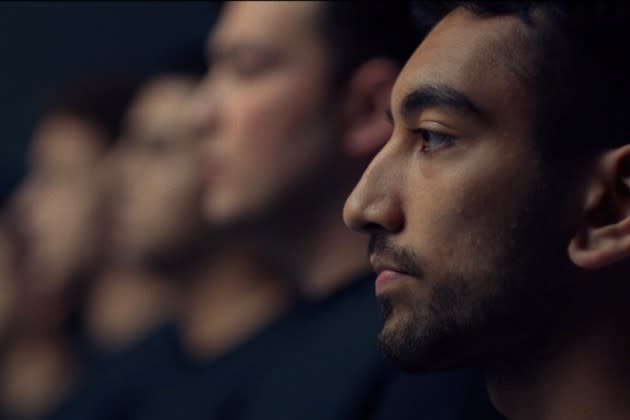‘In Camera’ Review: An Actor Fails One Audition After Another — But Finds a Part — In an Acidly Funny Industry Satire

The thing Aden likes about acting, he tells someone who cares enough to ask, is “how organized it is.” You know where you stand, quite literally, because someone tells you; you’re given things to say, and told how to say them. Order and certainty aren’t typically seen as benefits of the thespian calling, and even Aden doesn’t sound entirely convinced of his own words. But then Aden — played, in a performance of brilliant, diamantine versatility, by Nabhaan Rizwan — is never entirely convinced of himself, period, when he hasn’t a script to follow or a character to inhabit. A simultaneously playful and savagely pointed satire from first-time feature director Naqqash Khalid, “In Camera” traces how its young British-Asian protagonist’s sense of identity is progressively diminished by the cynicism and tokenism of the industry he’s trying to crack — though as it turns out, when you lose yourself entirely, all is not lost.
Self-reflexive satirical filmmaking of this nature is relatively rare on the British independent scene — perhaps, in part, because financing and producing features at all is such a strenuous endeavor that artists are loath to bite any of the various hands feeding them. “In Camera” is notable as a debut for the gutsy, darkly hilarious accuracy of its take on an industry where people of color are still patronized as interchangeable quota-fillers, and where notions of “authenticity” are commodified to the extent that they become entirely imitative poses. But it’s also notable as a debut, straight up: As formally vital as it is thematically ambitious, Khalid’s film kicks off what will surely be a busy festival tour in Karlovy Vary’s Proxima competition, while discerning distributors should be drawn to its gleaming technique and topical resonance.
More from Variety
Alicia Vikander Says Her Role in Sci-Fi Thriller 'The Assessment' Is 'Pretty Wild,' and 'Scares' Her
It opens on a gaudily lit crime scene, as hardened detectives mutter familiar clichés over a dead body — barely maintaining the illusion of reality ahead of the reveal that we’re actually on the set of a middling police procedural series. Between takes, the disgruntled lead (Aston McAuley) fumes over the phone to his agent, desperate to exit the show; the murder victim, T-shirt streaked with fake blood, offers him a fannish compliment, getting a brusque “Yeah, sure” in response. The first of several unexpected pivots is that it’s this barely-noted extra, not the star, that we follow off the set: This is Aden, and while an incidental corpse isn’t much of a role, it’s at least one that he’s managed to book.
For the rest, his career is largely made up of unsuccessful auditions, his days spent lined up with British-Asian actors who look superficially like him, as they repeatedly vie for the limited roles available to men with their skin colour: Getting to play a generic Middle Eastern terrorist is one of the more plum opportunities. (Filmmakers get likewise boxed and branded according to race: Khalid winkingly namechecks himself as the director of a hot project, though an actor’s agent only recalls him as “whatever, the Asian dude.”) To make up the rent for the spartan apartment he shares with distracted doctor roommate Bo (Rory Fleck Byrne), Aden has to get creative, acting as a bereaved woman’s dead son in a therapy project that goes gradually haywire.
It’s a device borrowed from Yorgos Lanthimos’s “Alps,” which is some clue as to the prickly, perverse narrative games Khalid is playing here. There are glinting reflections of such wily British experimenters as Nicolas Roeg and Peter Strickland, too, in his filmmaking, though little feels derivative here: There’s a confident starkness to DP Tasha Back’s compositions, which bear the hard gloss of a world Aden can’t quite penetrate, and to Paul Davies’ rich sound design, which amplifies even a pin piercing a shirt collar to a forbiddingly alien degree.
At a script level, “In Camera” perhaps has an excess of enticing ideas, some given more breathing room than others. In particular, an oblique subplot involving Bo’s own absent search for personhood feels unrealized both on its own terms and as a complement to Aden’s serpentine story — which is more successfully activated when he and Bo take on a third roommate. Played by a superb Amir El-Masry, capturing just the right balance between jockish and preening, vacuous menswear stylist Conrad is as loudly self-regarding as Aden is quietly, intently watchful — with a life that the young actor begins to believe he could play rather well.
Conrad affects a cultural kinship with Aden, bluffly insisting that it’s “their” time to seize the spotlight; his words ring as hollow as the buzzword-heavy claims of various casting directors’ and photographers to be all about diversity and “real people.” That cuts no ice with our protagonist, who’s never more comfortable than as a fake person: The void at the core of Rizwan’s stunningly limber portrayal, as Aden effortlessly slips between characters and stalls when playing himself, is what’s most compelling. It’s a passive-aggressive tour de force that ought to put the star, hitherto best known for secondary roles in “Mogul Mowgli” and TV’s “Station Eleven,” at the top of more casting directors’ lists. Still, “In Camera’s” satire strikes a dry cautionary note about the perils of a raised profile.
Best of Variety
Sign up for Variety’s Newsletter. For the latest news, follow us on Facebook, Twitter, and Instagram.

 Yahoo News
Yahoo News 